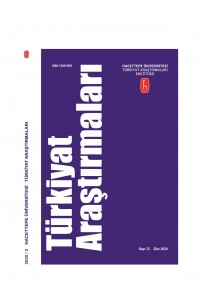Öz
Öz: Michel Foucault; 19. yüzyılın tarih, 20. yüzyılın ise mekân çağı olduğunu belirtir. Bundan dolayı Foucault, toplumu çözümlerken mekâna özel bir önem vermiş; getirmiş olduğu “heterotopya” kavramı ile sosyal bilimler alanında mekâna dair söylemleri genişletmiştir. Heterotopya, kültürden kültüre farklılık gösterebilir ve tek bir mekânın içinde birçok zaman ve mekânı barındırabilir. Heterotopyanın bu iki özelliği, Ahmet Hamdi Tanpınar’ın Ankara, Konya, Erzurum, Bursa ve İstanbul’u anlattığı Beş Şehir adlı eserini çözümlemek için de önemli veriler sunar. Tanpınar’ın seçtiği beş şehir, birçok farklı medeniyete ev sahipliği yaptığı için farklı medeniyetlerin kendilerine özgü dokusu mekâna işlemiştir. Dolayısıyla bahsedilen her mekânda farklı zamanların izlerine rastlanır. Bu makalede Michel Foucault’nun çalışmaları ekseninde Tanpınar’ın Beş Şehir’inde yer alan heterotopik mekânlar incelenecektir.
Anahtar kelimeler: Ahmet Hamdi Tanpınar, Beş Şehir, şehir, heterotopya, mekân.
Anahtar Kelimeler
Kaynakça
- And, M. (1982). Osmanlı Şenliklerinde Türk Sanatları. Ankara: Kültür ve Turizm Bakanlığı Yay.
- Bachelard, G. (2014). Mekânın Poetikası (A. Tümertekin, Çev.). İstanbul: İthaki Yay.
- Barthes, R. (1996). Camera Lucida, Fotoğraf Üzerine Düşünceler (R. Akçakaya, Çev.). İstanbul: Altıkırkbeş Yay.
- Foucault, M. (2017). Hapishanenin Doğuşu (M. A. Kılıçbay, Çev.). Ankara: İmge Kitabevi.
- Focault, M. (2015). Kelimeler ve Şeyler (M. A. Kılıçbay, Çev.). Ankara: İmge Kitabevi.
- Foucault, M. (2014). Özne ve İktidar (I. Ergüden, Çev.). İstanbul: Ayrıntı Yay.
- Foucault, M. (1980). “Questions on Geography”. Power/Knowledge (C. Gordon Ed.). Londra: Harvester Press.
- Harvey, D. (2011). Umut Mekânları (Z. Gambetti, Çev.). İstanbul: Metis Yay.
- Hetherington, K. (1997) The Badlands of Modernity: Heterotopia and Social Ordering. London: Routledge.
- Kaymaz Koca, S., Jonathan, H. (2017). “‘Üçüncü/Öteki Yer’ Üzerine Bir Kavramsallaştırma Denemesi: Mekansal Bir Trilojinin İçinde Saklı Hikayelerin Keşfedilmesi”. Megaron. 488-496.
- Lefebvre, H. (2016). Mekânın Üretimi (I. Ergüden, Çev.). İstanbul: Sel Yay.
- Nalçaoğlu, H. (2002). “Heterotopya, Koloni ve Öteki Mekânlar: Michel Foucault’nun Kısa Bir Metni Üzerine Düşünceler”. Doğu Batı, 19: 125-140.
- Stavrides, S. (2016). Kentsel Heterotopya. Özgürleşme Mekânı Olarak Eşikler Kentine Doğru. Çev. Ali Karatay. İstanbul: Sel Yay.
- Tandaçgüneş, N. (2013). Ütopya: Antikçağdan Günümüze Mutluluk Vaadi. İstanbul: Ayrıntı Yay.
- Tanpınar, A. H. (2016). Beş Şehir. Açıklama ve Notlar: Beşir Ayvazoğlu. İstanbul: Dergâh Yay.
- Tanpınar, A. H. (2000). Yaşadığım Gibi. Haz: Birol Emil. İstanbul: Dergâh Yay.
Öz
Abstract: Michel Foucault states that the 19th century is the age of history, and the 20th century is that of space. He attached special importance to space in analyzing societies utilizing the concept of “heterotopia”, a term he introduced expending thus the discourse on space in the field of social sciences. Heterotopia can differ from one to another cultural areas and can accommodate different periods and places within a single space. These two features of heterotopia also provide important tools for analyzing Ahmet Hamdi Tanpınar's book Five Cities where he describes the cities of Ankara, Konya, Erzurum, Bursa and Istanbul. The five cities chosen by Tanpınar host many different civilizations, their unique nature embedded into space. Therefore, traces of different eras are observed in every place mentioned. In this article, heterotopic places in the Beş Şehir novel of Tanpınar will be examined following the theoretical framework of Michel Foucault’s works.
Keywords: Ahmet Hamdi Tanpınar, Beş Şehir, city, heterotopia, place.
Anahtar Kelimeler
Kaynakça
- And, M. (1982). Osmanlı Şenliklerinde Türk Sanatları. Ankara: Kültür ve Turizm Bakanlığı Yay.
- Bachelard, G. (2014). Mekânın Poetikası (A. Tümertekin, Çev.). İstanbul: İthaki Yay.
- Barthes, R. (1996). Camera Lucida, Fotoğraf Üzerine Düşünceler (R. Akçakaya, Çev.). İstanbul: Altıkırkbeş Yay.
- Foucault, M. (2017). Hapishanenin Doğuşu (M. A. Kılıçbay, Çev.). Ankara: İmge Kitabevi.
- Focault, M. (2015). Kelimeler ve Şeyler (M. A. Kılıçbay, Çev.). Ankara: İmge Kitabevi.
- Foucault, M. (2014). Özne ve İktidar (I. Ergüden, Çev.). İstanbul: Ayrıntı Yay.
- Foucault, M. (1980). “Questions on Geography”. Power/Knowledge (C. Gordon Ed.). Londra: Harvester Press.
- Harvey, D. (2011). Umut Mekânları (Z. Gambetti, Çev.). İstanbul: Metis Yay.
- Hetherington, K. (1997) The Badlands of Modernity: Heterotopia and Social Ordering. London: Routledge.
- Kaymaz Koca, S., Jonathan, H. (2017). “‘Üçüncü/Öteki Yer’ Üzerine Bir Kavramsallaştırma Denemesi: Mekansal Bir Trilojinin İçinde Saklı Hikayelerin Keşfedilmesi”. Megaron. 488-496.
- Lefebvre, H. (2016). Mekânın Üretimi (I. Ergüden, Çev.). İstanbul: Sel Yay.
- Nalçaoğlu, H. (2002). “Heterotopya, Koloni ve Öteki Mekânlar: Michel Foucault’nun Kısa Bir Metni Üzerine Düşünceler”. Doğu Batı, 19: 125-140.
- Stavrides, S. (2016). Kentsel Heterotopya. Özgürleşme Mekânı Olarak Eşikler Kentine Doğru. Çev. Ali Karatay. İstanbul: Sel Yay.
- Tandaçgüneş, N. (2013). Ütopya: Antikçağdan Günümüze Mutluluk Vaadi. İstanbul: Ayrıntı Yay.
- Tanpınar, A. H. (2016). Beş Şehir. Açıklama ve Notlar: Beşir Ayvazoğlu. İstanbul: Dergâh Yay.
- Tanpınar, A. H. (2000). Yaşadığım Gibi. Haz: Birol Emil. İstanbul: Dergâh Yay.
Ayrıntılar
| Birincil Dil | Türkçe |
|---|---|
| Bölüm | Makaleler |
| Yazarlar | |
| Yayımlanma Tarihi | 18 Kasım 2020 |
| Gönderilme Tarihi | 24 Kasım 2019 |
| Yayımlandığı Sayı | Yıl 2020 Sayı: 33 |


